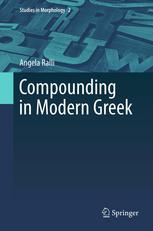

Most ebook files are in PDF format, so you can easily read them using various software such as Foxit Reader or directly on the Google Chrome browser.
Some ebook files are released by publishers in other formats such as .awz, .mobi, .epub, .fb2, etc. You may need to install specific software to read these formats on mobile/PC, such as Calibre.
Please read the tutorial at this link: https://ebookbell.com/faq
We offer FREE conversion to the popular formats you request; however, this may take some time. Therefore, right after payment, please email us, and we will try to provide the service as quickly as possible.
For some exceptional file formats or broken links (if any), please refrain from opening any disputes. Instead, email us first, and we will try to assist within a maximum of 6 hours.
EbookBell Team

4.3
58 reviewsOne of the core challenges in linguistics is elucidating compounds—their formation as well as the reasons their structure varies between languages. This book on Modern Greek rises to the challenge with a meticulous treatment of its diverse, intricate compounds, a study as grounded in theory as it is rich in data. Enhancing our knowledge of compounding and word-formation in general, its exceptional scope is a worthy model for linguists, particularly morphologists, and offers insights for students of syntax, phonology, dialectology and typology, among others. The author examines first-tier themes such as the order and relations of constituents, headedness, exocentricity, and theta-role saturation. She shows how Modern Greek compounding relates to derivation and inflection, and charts the boundaries between compounds and phrases. Exploring dialectically variant compounds, and identifying historical changes, the analysis extends to similarly formed compounds in wholly unrelated languages.